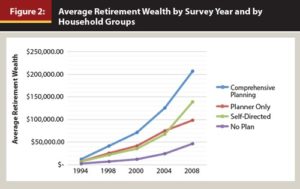
Thinking of Switching Careers? Consider Being a Financial Planner
The ideal job has three secret ingredients: purpose, mastery, and autonomy. You have all three in a financial planning career.
Six years ago, my favorite pastime was to read personal finance magazines. I would learn a lot, and could immediately apply it to my personal life. “Follow these three steps to boost your credit score,” and I would go ahead and do it! Soon I developed a desire to share all that knowledge to others, and thus started doing volunteer work giving practical financial tips to middle-class families. I realized it gave me an opportunity to make a difference in people’s lives. I believe it can do the same for you.
Purpose
As a financial planner, you can help your friends, neighbors, and fellow Americans use money as a tool to live a richer life.
Money remains the #1 cause of stress and divorce. Financial literacy in our country (and in many parts of the world) is very low. According to a Brookings study, middle class families lose billions of dollars a year in costly avoidable financial mistakes.
For example, one of my new clients did not take care of her credit score and is thus having to pay thousands more in interest payments on her student loans. Another one couldn’t qualify for a mortgage for the same reason. If your friends don’t steer clear of hidden fees in their 401k and IRA funds, they may be one of the millions of American middle-class families who collectively lose $17 billion a year in hidden fees and back-door payments to Wall Street.
As a financial planner, you can help American families align their money with their values, develop a smart way to budget, and help them prioritize between competing goals like saving for a wedding, a house, and retirement.
You can help your fellow Americans build their wealth. A 2014 academic study showed that those with a comprehensive financial plan accumulated up to four times more wealth. Another study of 425,000 savers showed that those who worked with a professional on their retirement investments achieved an annual return that was three percentage points higher. This can translate to tens of thousands of dollars more in wealth.
By giving fellow Americans practical advice on how to manage their money, you can reduce their stress and help them achieve financial freedom.
Mastery
The field encompasses many topics, which you understand deeper along the way. Even after memorizing a ton of material to pass the grueling CFP Exam, you will fully absorb the material on investments, retirement, and tax planning as you implement them with your clients.
The great thing about this field is it teaches you how to fish for information. You may not remember everything, but your training will allow you to retrieve information quickly, understand the material, and discern the most trustworthy source.
The field of financial planning is very dynamic. Each month, new academic studies are produced that give us new insight on both technical materials and novel approaches. Recently, I have taken a special interest in life planning, which helps my clients reorganize their relationship to money so that their resources are used to support what they value most in their life.
Autonomy
Once you become a full-fledged financial planner in an existing firm, you obtain broad autonomy over the advice that you give to your clients (although it’s best practice to discuss your recommendations with your superior or co-worker).
You can also choose to establish an independent practice, during which you have complete autonomy over your business. Aside from being responsible to the advice that you give to your clients, you can steer the direction of your business in terms of your target clients, pricing, marketing strategy, and team composition.
You can set your own schedule. I can easily take the Monday or Friday off if I’d like to go an extended beach or hiking trip. I can visit with my mom and sisters even if they live far away since I am able to work remotely. I’ve even met a fellow CFP professional who travels for six months a year with his family!
Do you have what it takes to become a successful financial planner?
You might think that the number one skill needed is superior math skills. Having a good mathematical intuition is important. But with the abundance of online financial planning tools, we rarely have to do hard number crunching. If you know how to add and subtract, are comfortable with spreadsheets, and are willing to learn, you’re good to go!
I’m convinced that the three crucial skills in this profession are empathy, deep listening, and non-judgement. This is particularly important because one of the main hurdles of improving financial literacy is that people are intimidated with money. More than 70% of Americans say they are scared of talking to a financial advisor.
High demand
Lastly, the financial advisory profession is one of the fastest-growing careers. It is expected to grow at an astonishing 30% over the next decade. And it’s in need of young talent, given that the average age of financial advisors is about 50 years old.
Americans are also starting to realize the value in having an expert in their financial corner. The use of financial advisors has increased significantly, with 7 in 10 indicating they work with a CFP® professional.
Discerning our ideal career path can be a long, arduous process. It was certainly the case for me. If you’d like a career that gives you purpose, mastery, and autonomy, consider being a financial planner. It can be a rewarding experience. If you have questions about being a financial planner, feel free to contact me via www.districtcapitalmanagement.com.
So what do you think? How does your current profession give you purpose, mastery, and autonomy?




Engage us on Facebook
Follow us on Twitter
Tweets by @mymcmedia